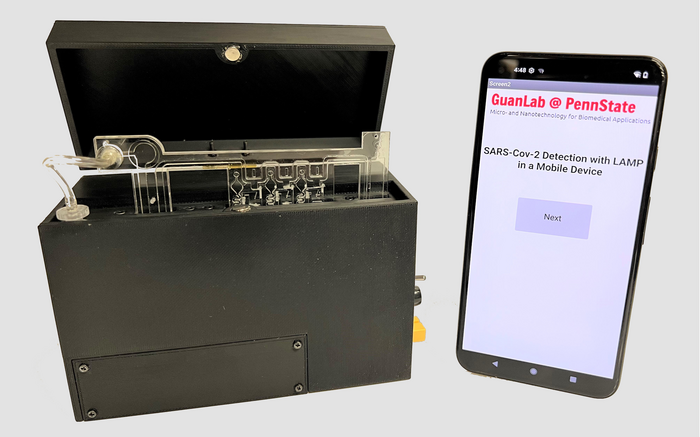At-home COVID-19 tests have become an easy way to self-diagnose. But current tests have drawbacks, such as the length of time it takes to get an answer, or how accurately the test can identify a positive case. And most of them require the uncomfortable procedure of sticking a swab up one’s nose. Now, researchers reporting in ACS Sensors have developed a SARS-CoV-2 saliva assay and prototype device that combine speed and ease with high sensitivity.

Credit: Weihua Guan
At-home COVID-19 tests have become an easy way to self-diagnose. But current tests have drawbacks, such as the length of time it takes to get an answer, or how accurately the test can identify a positive case. And most of them require the uncomfortable procedure of sticking a swab up one’s nose. Now, researchers reporting in ACS Sensors have developed a SARS-CoV-2 saliva assay and prototype device that combine speed and ease with high sensitivity.
The two main options for at-home COVID-19 testing today are rapid antigen tests and those based on reverse transcription polymerase chain reaction (RT-PCR). Rapid antigen testing delivers a result directly to the user in about 15 minutes, but it’s not very sensitive and can provide a false-negative signal, meaning someone could unknowingly infect others. Though RT-PCR is known as the “gold-standard” assay because of its high sensitivity and specificity for SARS-CoV-2, it requires the sample to be sent away to a lab and be analyzed by specialized personnel. The analysis itself can take up to an hour, but the total time from swab to answer can take days. Plus, both methods require the uncomfortable process of swabbing the back of your nose.
Non-invasive saliva-based tests exist, but they also rely on the slow and specialized RT-PCR approach. A similar method called reverse transcription loop-mediated isothermal amplification (RT-LAMP) can also detect viral SARS-CoV-2 RNA at a level of specificity and sensitivity consistent with RT-PCR, but it’s quicker, cheaper and easier to use. Therefore, Weihua Guan and colleagues wanted to see if they could use RT-LAMP to create a fast and sensitive COVID-19 test that only requires a saliva sample; a palm-sized, portable device; and a smartphone.
The researchers integrated several steps into one compact machine, which they call the saliva-based SARS-CoV-2 self-testing with RT-LAMP in a mobile device (SLIDE). Its five distinct modules conduct all of the steps needed for RT-LAMP: heating the sample, mixing it with RT-LAMP reagents, carrying out the reaction, detecting how much viral RNA is present and communicating that result to a smartphone. To use SLIDE, a person simply spits into a vial on a cartridge that they insert into the device, and results are sent to a smartphone within 45 minutes. In lab tests, SLIDE successfully detected and quantitated a mock saliva sample spiked with inactivated SARS-CoV-2 virus particles, as well as a real saliva sample from someone known to be positive for COVID-19. In both cases, the results were consistent with those from RT-PCR, which suggests that the SLIDE device could be a quick, easy and sensitive way to tell whether someone has COVID-19, say the researchers.
The authors acknowledge funding from the National Institutes of Health, National Science Foundation and Penn State Coronavirus Research Seed Fund.
The paper’s abstract will be available on Aug. 3 at 8 a.m. Eastern time here: http://pubs.acs.org/doi/abs/10.1021/acssensors.2c01023.
For more of the latest research news, register for our upcoming meeting, ACS Fall 2022. Journalists and public information officers are encouraged to apply for complimentary press registration by completing this form.
The American Chemical Society (ACS) is a nonprofit organization chartered by the U.S. Congress. ACS’ mission is to advance the broader chemistry enterprise and its practitioners for the benefit of Earth and all its people. The Society is a global leader in promoting excellence in science education and providing access to chemistry-related information and research through its multiple research solutions, peer-reviewed journals, scientific conferences, eBooks and weekly news periodical Chemical & Engineering News. ACS journals are among the most cited, most trusted and most read within the scientific literature; however, ACS itself does not conduct chemical research. As a leader in scientific information solutions, its CAS division partners with global innovators to accelerate breakthroughs by curating, connecting and analyzing the world’s scientific knowledge. ACS’ main offices are in Washington, D.C., and Columbus, Ohio.
To automatically receive news releases from the American Chemical Society, contact [email protected].
Follow us: Twitter | Facebook | LinkedIn | Instagram
Journal
ACS Sensors
DOI
10.1021/acssensors.2c01023
Article Title
SLIDE: Saliva-based SARS-CoV-2 Self-Testing with RT-LAMP In a Mobile Device
Article Publication Date
3-Aug-2022




